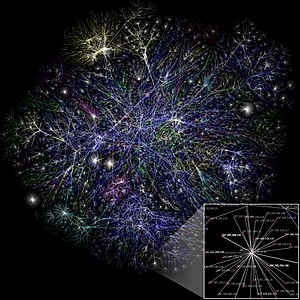Opte Project

The Opte Project, created in 2003 by Barrett Lyon,[1] seeks to generate an accurate representation of the breadth of the Internet using visual graphics.[2][3] Lyon believes that his network mapping can help teach students more about the Internet while also acting as a gauge illustrating both overall Internet growth and the specific areas where that growth occurs.[2] It was not the first such project; others predated it, such as the Bell Labs Internet Mapping Project.
Lyon has been generating image maps using traceroute, and later switched to mapping using BGP routes. The generated images were published on the Opte Project website. In 2021, Lyon created different video animations, using his mapping technique: shedding light on internet growth between 1997 and 2021, the Iranian internet shutdown of 2019, the United States Department of Defense's place on the internet as well as the few entry points into the Chinese internet.
The project has gathered notice worldwide having been featured by Time,[4] Cornell University,[5] New Scientist,[6] and Kaspersky Lab.[7] In addition, Opte Project maps have found homes in at least two art galleries and exhibits such as The Museum of Modern Art[8] and the Museum of Science's Mapping the World Around Us permanent exhibit.[9]
Opte images are licensed under a Creative Commons license[10] and while use of The Opte Image is free for all non-commercial applications, a license fee is required for all others.[1][11][12]
References
- ^ a b "The Opte Project - FAQ". www.opte.org. LyonLabs LLC, Barrett Lyon. Archived from the original on August 24, 2017. Retrieved August 8, 2017.
- ^ a b "The Opte Project - About". www.opte.org. LyonLabs LLC, Barrett Lyon. Archived from the original on July 7, 2017. Retrieved August 8, 2017.
- ^ "Visual Complexity - Opte Project section". www.visualcomplexity.com. VisualComplexity.com. Archived from the original on December 20, 2013. Retrieved August 8, 2017.
- ^ "See What the Internet Actually Looks Like". Time. July 13, 2015. Archived from the original on August 21, 2017. Retrieved August 8, 2017.
- ^ "The Opte Project and Visualizing the Internet". blogs.cornell.edu. Cornell University. September 13, 2016. Archived from the original on August 9, 2017. Retrieved August 8, 2017.
- ^ "Internet mapping project weaves colourful web". www.newscientist.com. New Scientist, Ltd. November 28, 2003. Archived from the original on August 9, 2017. Retrieved August 8, 2017.
- ^ "7 amazing maps of the Internet". www.kaspersky.com. Kaspersky Lab. November 3, 2015. Archived from the original on August 9, 2017. Retrieved August 8, 2017.
- ^ "MOMA - Opte Project item". www.moma.org. Museum of Modern Art. Archived from the original on August 9, 2017. Retrieved August 8, 2017.
- ^ "Mapping the World Around Us". www.mos.org. Museum of Science. Archived from the original on June 24, 2012. Retrieved August 8, 2017.
- ^ "Creative Commons Attribution-NonCommercial 4.0 International (CC BY-NC 4.0) license". creativecommons.org. Creative Commons. Archived from the original on August 7, 2017. Retrieved August 8, 2017.
- ^ "The Opte Project - Licenses". www.opte.org. LyonLabs LLC, Barrett Lyon. Retrieved August 8, 2017.
- ^ "Barrett Lyon Website - Philanthropy section". Barrett Lyon. Archived from the original on February 16, 2017. Retrieved August 8, 2017.
External links
- Official website

- A "snapshot" version (courtesy of the "Wayback Machine")
